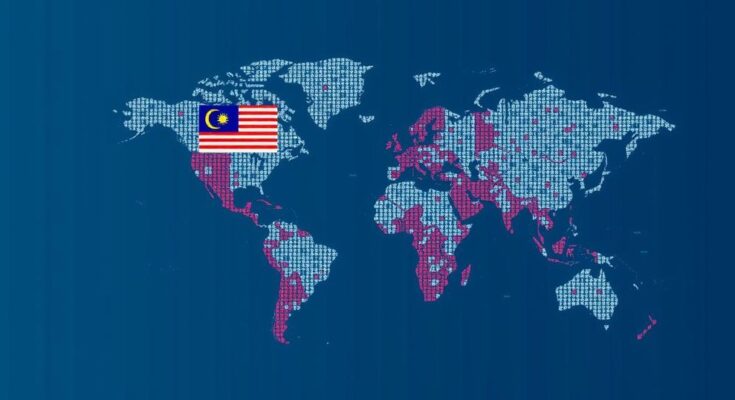In November, Prime Minister Anwar Ibrahim’s diplomatic visits to Egypt, Saudi Arabia, Peru, and Brazil enhanced Malaysia’s global standing ahead of its Asean chairmanship. His advocacy for Palestine during these engagements has garnered international attention, signaling Malaysia’s assertive foreign policy. Analysts praise Anwar for strengthening bilateral ties and promoting trade relations, marking a significant era for Malaysia’s diplomatic role.
Prime Minister Datuk Seri Anwar Ibrahim of Malaysia has engaged in significant diplomatic activity this month, with visits to key nations including Egypt, Saudi Arabia, Peru, and Brazil. Such engagements, particularly ahead of Malaysia’s upcoming Asean chairmanship, have been pivotal in enhancing Malaysia’s international position. Analysts commend Anwar’s advocacy for Palestine, which has highlighted humanitarian crises globally and earned Malaysia respect on the diplomatic front. Professor Tunku Mohar from the International Islamic University emphasizes that these efforts not only strengthen Malaysia’s bilateral ties but also position it favorably for leadership in Asean. Notably, Anwar received the prestigious Order of the Sun of Peru from Peru’s President Dina Boluarte in recognition of his efforts. Throughout his recent official visits, Anwar has demonstrated his commitment to collaborating on education, particularly with Al-Azhar University in Egypt, and has established trade relations at the 31st Apec Economic Leaders’ Meeting in Peru. Furthermore, his staunch support for Palestinian rights, presented at various international forums, has underscored Malaysia’s role in advocating for humanitarian concerns. Analysts suggest that these endeavors are instrumental in fostering relationships with nations that align with Malaysia’s interests. Moreover, analysts like Associate Professor Dr. Mazlan Ali of Universiti Teknologi Malaysia indicate that strengthening ties with Latin American nations can serve as a boon for Malaysia’s economy. These partnerships present opportunities in sectors such as trade, education, and technology, crucial as Malaysia seeks to enhance its global standing. The ongoing commitment to issues such as the Palestinian crisis signifies Malaysia’s dedication to humanitarian efforts and may influence foreign relations positively. Such a multifaceted diplomatic approach is expected to solidify Malaysia’s leadership role in Asean while contributing significantly to its economic and political interests.
The recent diplomatic engagements of Prime Minister Anwar Ibrahim mark an important phase for Malaysia, particularly as the nation approaches its Asean chairmanship in 2024. Anwar’s proactive foreign policy underscores Malaysia’s commitment to being an assertive player on the global stage. His focus on humanitarian issues, especially the Palestinian crisis, showcases Malaysia’s intention to position itself as a voice for advocacy in international discourse. The inclusion of Latin American countries in these diplomatic efforts signifies a strategic move to broaden economic partnerships and enhance trade relations, crucial for Malaysia’s economic growth.
In conclusion, Prime Minister Anwar Ibrahim’s recent diplomatic endeavors are reshaping Malaysia’s global image, particularly through strong advocacy for Palestine and the establishment of vital trade relationships with countries in Latin America. By receiving significant honors from foreign leaders and promoting regional cooperation, Anwar is positioning Malaysia as a potential leader in Asean and strengthening its economic prospects. These activities illustrate Malaysia’s growing influence on the world stage, demonstrating a balanced approach between humanitarian advocacy and economic development.
Original Source: www.malaymail.com




